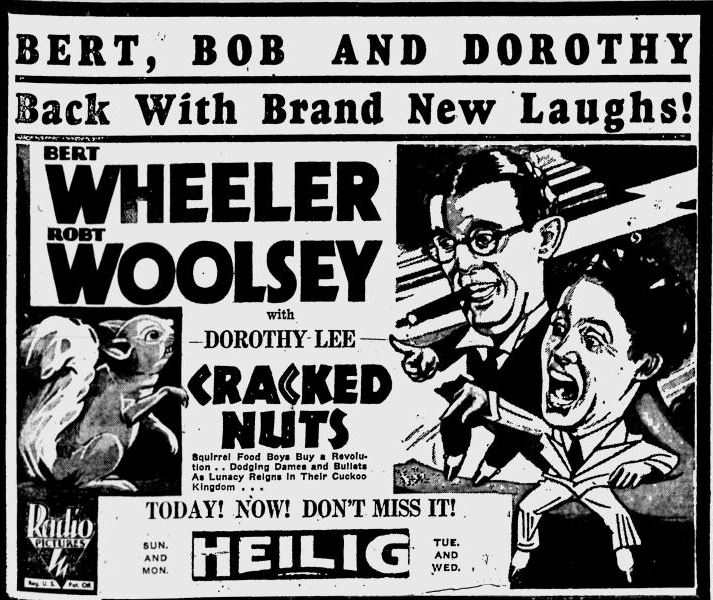
Meanwhile, unknown to Boris and the other conspirators, events in El Dorania have overtaken their plans. The king has been overthrown peacefully, having surrendered his sovereignty at a casino craps table to an American gambler (Woolsey). The stage is set for a mock-epic war of comics, who prove to be old buddies but whose claims to power are, of course, irreconcilable. Add to this the complication that Boris's conspirators and a powerful general at home intend to use whoever wins as a figurehead, and are willing to kill both once their usefulness expires, and add to that that Wheeler's girl and her aunt have followed him to El Dornaia, and he must still prove himself to them.
Why doesn't it work? More correctly, why doesn't it work now? Then, Cracked Nuts was a hit and made a profit for RKO, while Duck Soup notoriously flopped and put the Marxes' future in movies in jeopardy. With more historical context to work with, we can guess that the Marx film was seen as yet another in a soon-tiresome mythical kingdom genre that was fresher two years earlier. And that's all I've got, because I really can't imagine how anyone found Cracked Nuts funnier than Duck Soup. The Wheeler-Woolsey picture is inferior on every level. One reason why they haven't endured is that their comic personalities are shallow. The Marxes transformed themselves into iconic characters, each with a broad, intense, easily grasped persona. With Robert Woolsey in particular, you never see anything but a vaudeville comic doing his shtick. There's a fatal vibe of self-amusement when he and Wheeler lapse into practiced patter, like the scene when they find seemingly limitless ways to use the word "well" in a sentence, while the Marxes' comedy crackles with sibling rivalry and better writing. Wheeler and Woolsey never seem to do more than tell jokes self-consciously, except when Wheeler gets to sing and dance. They seem like rough drafts of better future comedians, never more so than a scene in which they compare war strategies while contemplating a map of El Dorania. The accursed nation has landmarks named "Which" and "What," among other things, and Woolsey's attempt to explain it all to Wheeler plays like a very rough draft of Abbott & Costello's "Who's On First."
Nor can Cline and his writers match the epic absurdity achieved by Leo McCarey and the Duck Soup writing team. There's no sense of larger satire here, nothing like the "We're Going to War" number or the surreal take on war-movie cliches in the Marx film. The climax of Cracked Nuts is the attempted execution of Woolsey by aerial bombing, with an unbilled, clean-shaven Ben Turpin, the cross-eyed man himself, piloting the death plane. As in many sound comedies, Turpin, apparently not trusted with dialogue, is reduced to a cameo turn in which his face is the one and only joke. The big joke of the scene is that Woolsey sneers at his fate, Wheeler having told him that he'd defused the bombs in advance, and refuses to move from his throne of doom even after live bombs start dropping. Years before, Cline had worked on Buster Keaton's early short subjects, but you wouldn't guess that from what you see here. Only a wordless sequence at the start of the picture with Wheeler waiting for an elevator hints at Cline's mighty heritage. Consider who he was working with, however. I've liked at least one Wheeler-Woolsey that I've seen, but that remains the exception. Watching them here, doing a mythical-kingdom bit, puts them head-to-head with the Marx Bros, and for that reason it also puts them in their place, however inconspicuous, for posterity.
No comments:
Post a Comment